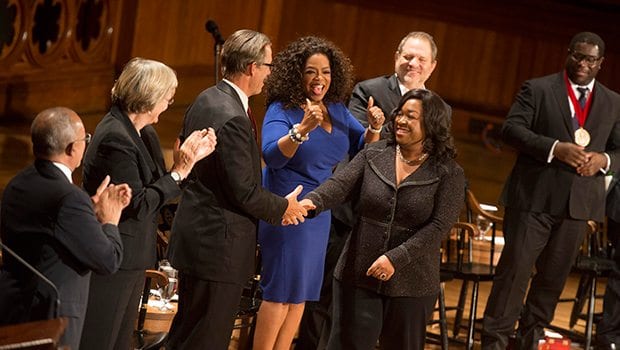
It was a celebration of excellence—specifically black excellence—in art and politics at Sanders Theatre in Cambridge on September 30. For the second year, Harvard University’s Hutchins Center for African & African American Research presented the W.E.B. Du Bois Medal to eight individuals who have excelled and who are trailblazers in their respective fields.
The Du Bois Medal is Harvard’s highest honor in the field of African and African American Studies and has been awarded since 2000 to individuals in the U.S. and around the world in recognition of their contributions to African American culture.
This year’s honorees included a who’s who in the world of art, literature, design and politics. The stellar line-up included architect David Adjaye; artist and humanitarian Harry Belafonte; U.S. Representative John Lewis; filmmaker Steve McQueen; television producer and writer Shonda Rhimes; The Weinstein Company co-chairman, Harvey Weinstein; Oprah Winfrey; and poet and author Maya Angelou, who was honored posthumously.
Just as highly regarded were the presenters: author and Harvard University professor Jamaica Kincaid; American Repertory Theater’s artistic director Diane Paulus; and Governor Deval Patrick.
Patrick presented the first award, to U.S. representative John Lewis, who was a 2013 honoree but was unable to attend due to the federal government shutdown last year. In his remarks about Lewis, Governor Patrick said, “We’re hungry for moral leadership.” Lewis has gained a lot of capital, Patrick said, and “it’s the spending of accumulative capital that moves things forward,” and Lewis has done that.
“All I tried to do is help out,” was Lewis’ humble response on receiving the award.
Jamaica Kincaid, who presented the Du Bois Medal in honor of Maya Angelou, called Angelou “bold and brave” and said, “she was our gift.” Winfrey accepted on behalf of her ‘sister friend’ and said that Angelou, who spoke six languages, “was most fluent in the poetry of humanity.”
Architect and Harvard educator Mohsen Mostafavi presented the medal to British architect David Adjaye, whose buildings he described as “alive with color, light, and depth.” Adjaye, who was awarded the Order of the British Empire for his services to architecture in 2007, was commissioned to design the Smithsonian Institution’s National Museum for African American History and Culture on the National Mall in Washington, D.C., which is expected to open in 2016.
In his remarks before introducing 12 Years a Slave filmmaker Steve McQueen, Harvard’s William Julius Wilson made the connection between Solomon Northup and Michael Brown of Ferguson, Missouri, and stating that a person can be “thrown into bondage or shot dead because of his black skin.”
Steve McQueen, who humbly accepted his award, said that for him, movies are about creating debate and that his commitment is “to not let the dust settle.”
One of the most enthusiastic presenters of the evening was Lawrence D. Bobo, Chair of the Department of African and African American Studies, who had the honor of presenting the Du Bois Medal to Shonda Rhimes, creator of ABC’s Scandal. In his introduction, Bobo said that Rhimes has brought “sophistication, depth and fullness to African American characters.” Once Rhimes hit the podium, although brief, she said that she didn’t “think it was remarkable that television looked like the rest of the world.” She was raised by people who told her that her only limits were her imagination, and concluded her acceptance speech by saying “I’m just getting started.”

Oprah Winfrey speaking at the podium after receiving her W.E.B. Du Bois Medal. (L-R): Oprah Winfrey; Drew Gilpin Faust, President of Harvard; and Henry Louis Gates, Jr., Harvard University’s Alphonse Fletcher University Professor and Director of the Hutchins Center for African and African American Research at Harvard University.
Rounding out the awards ceremony was the woman of the hour and whom everyone was waiting for, Oprah Winfrey. Harvard University’s President Drew Gilpin Faust presented the W.E.B. Du Bois Medal to Winfrey for her “unmatched and exemplary contributions.” During her acceptance speech, Winfrey said that when she first began in television she was just happy to have a job. Now, she asks herself, “How can I use television to inform them, to engage them, to bring little pieces of light into their lives?” “How can I be used?” and “How can I use my life as a constant expression of art?” She now knows the answers to those questions because, as she said upon receiving the award, “I’m on the right path.”
The evening ended the way it began, with celebration in song and words from Harvard University’s Reverend Jonathan L. Walton, Henry Louis Gates, Jr., director of the Hutchins Center for African & African American Research, and the Kuumba Singers of Harvard College.






